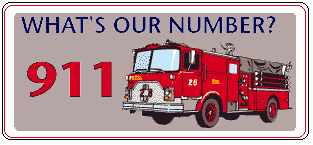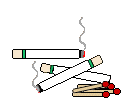Fire Prevention Awareness Week October 6-12, 2013
"Prevent Kitchen Fires"—this year's message!
Stay Fire Smart! Don’t Get Burned Fire Prevention Week 2010 focuses Smoke Alarms as well as keeping homes safe from the leading causes of home fires. Ladybug, Ladybug Nursery Rhyme Ladybug! Ladybug! All except one, Make sure all family members know what to do in the event of a fire. Draw a floor plan with at least two ways of escaping every room. Make a drawing for each floor. Dimensions do not need to be correct. Make sure the plan shows important details: stairs, hallways and windows that can be used as fire escape routes. Conduct a family meeting and discuss the following topics: Practice evacuating the building blindfolded. In a real fire situation, the amount of smoke generated by a fire most likely will make it difficult to see. Post emergency numbers near telephones. After a fire emergency Make sure you have a safe fire escape method for all situations Space Heaters Need Space Smokers Need To Be Extra Careful Be Careful Cooking Use Electricity Safely Fire can engulf a house in 60 seconds! This website is provided by Maggie Blaser, Owner, Dubuque Fire Equipment, Inc. DbqFire.net is designed, serviced, and maintained by Maggie Blaser
Many bedroom fires are caused by misuse or poor maintenance of electrical devices, careless use of candles, smoking in bed, and children playing with matches and lighters. Most potential hazards can be addressed with a little common sense. For example, be sure to keep flammable items like bedding, clothes and curtains at least three feet away from portable heaters or lit candles, and never smoke in bed. Also, items like appliances or electric blankets should not be operated if they have frayed power cords, and electrical outlets should never be overloaded. Fire Safety Checklist:
Testing the water before putting a child in the bath may sound like common sense. Wearing short or close-fitting sleeves when cooking on the stovetop may show foresight. This and other simple actions may be all it takes to prevent devastating burns.
Fly away home.
Your house is on fire.
And your children all gone.
And that's little Ann,
For she crept under
The frying pan



![]()
Install Smoke Detectors
Check smoke detectors once a month and change the batteries at least once a year. Smoke detectors sense abnormal amounts of smoke or invisible combustion gases in the air. They can detect both smoldering and burning fires. At least one smoke detector should be installed on every level of a structure. Purchase smoke detectors labeled by the Underwriters Laboratories (UL) or Factory Mutual (FM). ![]()
Test windows and doors "Do they open easy enough? Are they wide enough? Are they tall enough?"
Choose a safe meeting place outside the house.
Practice alerting other members. It is a good idea to keep a bell and flashlight in each bedroom.![]()
![]() Always sleep with the bedroom doors closed. This will keep deadly heat and smoke out of bedrooms, giving you additional time to escape.
Always sleep with the bedroom doors closed. This will keep deadly heat and smoke out of bedrooms, giving you additional time to escape. Find a way for everyone to sound a family alarm. Yelling, pounding on walls, whistles, etc. Practice yelling "FIRE!"
Find a way for everyone to sound a family alarm. Yelling, pounding on walls, whistles, etc. Practice yelling "FIRE!" In a fire, time is critical. Don't waste time getting dressed, don't search for pets or valuables. Just get out!
In a fire, time is critical. Don't waste time getting dressed, don't search for pets or valuables. Just get out! Roll out of bed. Stay low. One breath of smoke or gases may be enough to kill.
Roll out of bed. Stay low. One breath of smoke or gases may be enough to kill.![]()
Practice staying low to the ground when escaping.
Feel all doors before opening them. If a door is hot, get out another way.
Learn to stop, drop to the ground, roll if clothes catch fire.![]()
Be aware that if a fire threatens your home, you should not place the call to emergency services from inside the home. It is better to get out and place the call to fire authorities from a safe location outside the home.
Give first aid where appropriate. Seriously injured victims should be transported to professional medical help immediately. Stay out of the damaged building. Return only when fire authorities say it is safe.
You may have installed a very expensive home security system. But if you cannot escape the burning structure you have a false level of confidence.
Keep portable and space heaters at least 3 feet from anything that may burn. Never leave heaters on when you leave home or go to sleep. Children and pets should always be kept away from them.
Never smoke in bed or when you are sleepy. Carelessly discarded cigarettes are a leading cause of fire deaths in the United States.
Keep cooking areas clear of combustibles and wear short or tight-fitting sleeves when you cook. Keep the handles of your pots turned inward so they do not over-hang the stove. If grease catches fire, carefully slide a lid over the pan and smother the flames, then turn off the burner.
Matches and Lighters are Dangerous
In the hands of a child, matches and lighters can be deadly! Store them where kids can't reach them, preferably in a locked area. Teach children that matches and lighters are "tools" and should only be used by adults.![]()
If an appliance smokes or has an unusual smell, unplug it immediately and have it repaired. Replace frayed or cracked electrical cords and don't overload extension cords. They should not be run under rugs. Never tamper with the fuse box or use the improper size fuse.
Cool a Burn
If someone gets burned, immediately place the wound under cool water for 10 to 15 minutes. If the burn blisters or chars, see a doctor immediately!
Be Careful of Halogen Lights
If you have halogen lights, make sure they are away from flammable drapes and low ceiling areas. Never leave them on when you leave your home or office.![]()
Make sure you have a safe and quick method of escape!

